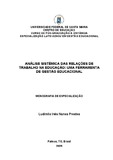| dc.contributor.advisor | Possa, Leandra Bôer | |
| dc.creator | Prestes, Ludimila Inês Nunes | |
| dc.date.accessioned | 2018-06-19T13:08:56Z | |
| dc.date.available | 2018-06-19T13:08:56Z | |
| dc.date.issued | 2009-12-15 | |
| dc.date.submitted | 2009 | |
| dc.identifier.uri | http://repositorio.ufsm.br/handle/1/13456 | |
| dc.description | Monografia (especialização) - Universidade Federal de Santa Maria, Centro de Educação, Curso de Especialização em Gestão Educacional, EaD, RS, 2009. | por |
| dc.description.abstract | To study the role of interactions between the members of the school system and,
consequently, its reflection on the management and on the teaching-learning is of
fundamental importance for the members of the system. This understanding is
developed with focus on the Systemic Theory, where the object on which the
intervention will occur is the interaction between the subjects that make up the
system. Therefore considering the interactions as external / internal influences of the
teaching-learning process, the degree of relevance of the interactions between
education professionals and their performance at school was questioned. In this light,
this study aimed to make a bibliographical study focused on the systemic analysis of
labor difficulties arising from the dysfunctions in the interaction between the school
system professionals. With the results, the construction of strategies to facilitate the
teaching-learning process through a systemic perspective is enabled. Therefore, it was
established as specific objectives to present some definitions of learning; to make a
bibliographical survey of factors that could influence teachers in their professional
careers; check whether the dysfunctions in the interactions can affect job
performance; suggest strategies to mitigate the difficulties and / or improve the
interaction between these professionals. From the literature consulted, it was
observed that several internal and external factors can influence positively or
negatively the performance of professionals. As they are understood by the Systemic
Theory, these factors find themselves interrelated and interdependent. | eng |
| dc.language | por | por |
| dc.publisher | Universidade Federal de Santa Maria | por |
| dc.rights | Acesso Aberto | por |
| dc.rights | Attribution-NonCommercial-NoDerivatives 4.0 International | * |
| dc.rights.uri | http://creativecommons.org/licenses/by-nc-nd/4.0/ | * |
| dc.subject | Teoria sistêmica | por |
| dc.subject | Gestão educacional | por |
| dc.subject | Interações | por |
| dc.subject | Systemic theory | eng |
| dc.subject | Educational management | eng |
| dc.subject | Interactions | eng |
| dc.title | Análise sistêmica das relações de trabalho na educação: uma ferramenta de gestão educacional | por |
| dc.title.alternative | Systemic analysis of labor relations in education: a toll for educational management | eng |
| dc.type | Trabalho de Conclusão de Curso de Especialização | por |
| dc.degree.local | Polo de Palmas, TO, Brasil | por |
| dc.degree.specialization | Gestão Educacional, EaD | por |
| dc.description.resumo | Estudar o papel das interações entre os membros do sistema escolar e,
conseqüentemente, o seu reflexo sobre a gestão e o ensino-aprendizagem é de
fundamental importância para os membros do sistema. Pensando nas interações
como influências externas/internas do processo de ensino-aprendizagem,
questionou-se quanto ao grau de relevância das interações entre os profissionais de
educação e seu desempenho no âmbito escolar. Diante do exposto, o presente
estudo teve como objetivo realizar um estudo bibliográfico com foco na análise
sistêmica das dificuldades laborais advindas de disfunções na interação entre os
profissionais do sistema escola, possibilitando, posteriormente, facilitar o processo
ensino-aprendizagem através de um olhar sistêmico. Para tanto, estabeleceu-se
como objetivos específicos discutir algumas definições de aprendizagem; fazer um
levantamento bibliográfico dos fatores que poderiam influenciar os professores em
sua atuação profissional; verificar se as disfunções nas interações podem
influenciam o desempenho profissional; sugerir estratégias para amenizar as
dificuldades e/ou melhorar a interação entre estes profissionais. A partir da literatura
consultada, observou-se que vários fatores internos (emocionais, afetivos,
motivacionais, auto-estima) e externos (sócio-econômicos, estrutura física, contexto
escolar, recursos materiais e humanos) podem influenciar positivamente ou
negativamente o desempenho dos profissionais, destacando-os enquanto interrelacionados
e interdependentes, tal como são compreendidos pela teoria sistêmica. | por |
| dc.publisher.country | Brasil | por |
| dc.publisher.initials | UFSM | por |
| dc.subject.cnpq | CNPQ::CIENCIAS HUMANAS::EDUCACAO | por |
| dc.publisher.unidade | Centro de Educação | por |



